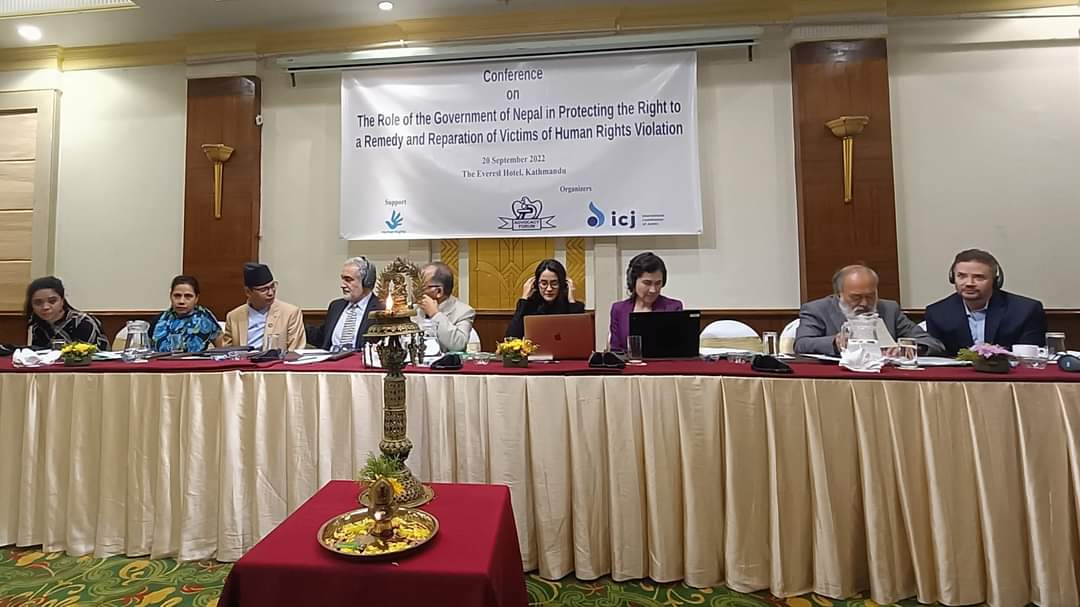The Government of Nepal should step up efforts to implement a proper transitional justice process in the country to provide full accountability and effective remedies and reparations for victims of the country’s civil war, said participants at a conference organized by the International Commission of Jurists (ICJ), in partnership with Advocacy Forum-Nepal (AFN), in Kathmandu on 20 September.
The conference, on the theme “Role of Government of Nepal (Including Provincial Governments) in Protecting the Right to a Remedy and Reparation of Victims for Human Rights Violations,” brought together leading Nepali and international experts, practitioners, diplomats, members of parliament and victims—the first such gathering after the failure of the incumbent Government to pass necessary amendments to the Transitional Justice law through Nepal’s Parliament.
This amendment failed despite significant efforts by Minister of Law, Justice and Parliamentary Affairs, Govinda Prasad Sharma Koirala (Bandi), as well as victims’ groups and civil society. The speakers and participants widely shared their frustration at the failure of the amendment, but also expressed hopes the demand that the Government would continue its efforts to implement the transitional justice law in conformity with orders of Nepal’s Supreme Court and international law.
The Law Minister highlighted the efforts that his Ministry had undertaken in amending the transitional justice -related legal framework. Defending the Bill, he expressed his hope that in the upcoming session, Parliament would be able to pass legislation incorporating the calls of stakeholders, including the victims’ community and civil society.
Bimala B.K, Member of Parliament, explained why she believed Parliament could not reach a consensus on the TRC Act Amendment Bill. Highlighting problems in the Bill such as the way human rights violations had been categorized, she indicated that the Government had presented the Bill in Parliament at a very late stage when Parliamentary session was due to expire, leaving no time for meaningful debate.
The ICJ considers that the Bill presented by the Government, while positive in some respects, needs further amendment to prevent amnesty for those responsible for gross violations of human rights, crimes against humanity, and war crimes. The Bill should contain provision to strengthen the TRC’s investigation if it has to function as the sole investigating authority for conflict era crimes as proposed by the Bill and the Special Court’s judges should be appointed following the procedures provided by the Constitution and its decision should be subjected to appeal. The Bill also needs to clarify the principle of non-retroactivity of criminal law in a manner consistent with international law.
Justice Kalyan Shrestha, former Chief Justice of Nepal’s Supreme Court and an ICJ Commissioner, pointed out that the government had failed to implement critical Supreme Court decisions relating to transitional justice. These decisions require the amendment of the existing TRC Act so as to ensure that there could be no amnesties for those involved in gross violations of human rights and crimes under international law and providing for victims to exercise their rights to effective remedies.
ICJ Secretary General Saman Zia-Zarifi reiterated the necessity for conforming with international human rights law and standards and urged the Nepali government to develop a legal framework for reparative measures that complies with the obligation of State to provide for effective remedies and reparations. He also expressed ICJ’s commitments toward Nepal’s TJ process and said that ICJ would be happy to contribute to the process.
Gita Rasaili, a representative from the victims’ community, highlighted the harm suffered by those who have been waiting for truth, justice and reparation for the last several years and how Government continued to fail to fulfil its obligations. She also highlighted how victims calling for legitimate process that guarantees victims right to effective remedies are subjected to attacks and labelled as ‘spoilers.’
The ICJ, together with several other national and international human rights organizations, has called on the Government, political parties and Parliament to prioritise this Bill in the forthcoming session of Parliament and pass the law after amending some of the provisions that are not consistent with Nepal’s international obligations and the decision of the Supreme Court.
Mandira Sharma, ICJ Senior International Legal Adviser, reminded how an ad hoc response of the Government to interim relief had blocked proper relief to victims and survivors. She highlighted the need for an amendment to the TRC Act to provide an overarching policy framework on reparation to ensure victims’ rights to reparation.
Ana Maria Mondragon, Deputy Judge at Special Jurisdiction for Peace (JEP) in Colombia shared comparative experiences from Colombia and how Colombia has designed country’s transitional justice process where more than nine million victims are registered. She emphasized the importance of the inclusion of victims and civil society in the design of the process, and the role of the international community in the monitoring of the process to safeguard international standards and principles. She also highlighted the mandates and works of JEP and the regime of sanctions that JEP is implementing.
Clara Sandoval, Director of Programmes, Global Survivors Fund (GSF) shared the global experiences in designing reparation for victims of conflict-related sexual violence. She highlighted different challenges that such victims faced and presented best practices in designing a reparation program for victims of sexual violence during the conflict.
Richard Howard, Resident Coordinator at the United Nations Resident Coordinator’s Office highlighted the importance of the nationally led transitional justice process and expressed willingness of his office to extend support needed in this process.
Nepal’s Secretaries of Federal and Provincial Ministry for Law, Justice and Parliamentary Affairs, Chief Attorneys of the Provinces, civil society organizations, victims, civil society organizations and diplomats also participated in the event.
Contact:
For the ICJ: Mandira Sharma, ICJ Senior International Legal Advisor, t: +977 9851048475; e: mandira.sharma@icj.org





